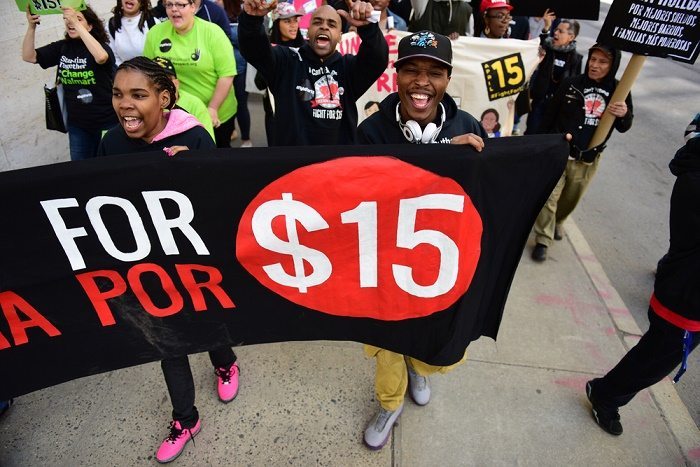New York Fast-Food Workers to Get $15 Minimum Wage
Fast-food employees in New York state will see their wages raised to $15 an hour, a major victory for the nationwide campaign to raise the pay of some of the country’s lowest-wage workers.

Fast-food employees in New York state will see their wages raised to $15 an hour, a major victory for the nationwide campaign to raise the pay of some of the country’s lowest-wage workers.
A three-member wage board convened by Gov. Andrew Cuomo (D) in May to review fast-food industry wages voted unanimously Wednesday to recommend that those wages be increased. The board’s recommendations will go to the state’s acting commissioner of labor, who is expected to put them into effect through an order that, similar to the president’s executive order powers, will bypass the state legislature.
Cuomo added a smaller wage increase proposal to a budget bill earlier this year but it was rejected by Republican lawmakers in the state legislature. The state’s $8.75 minimum wage is equivalent to $7 an hour when New York City’s cost of living is factored in, according to an analysis by FiveThirtyEight. That same minimum wage is worth about $9.60 in upstate New York.
The $15 minimum wage, if approved, would be fully implemented by 2021 and worth $11.27 in the New York City area, per FiveThirtyEight.
“If the Republican senate does not want to hear it, then I’ll use the powers that I have,” Cuomo wrote in a New York Times op-ed announcing his decision to convene a wage board panel.
“Nowhere is the income gap more extreme and obnoxious than in the fast-food industry,” he added. “The average fast-food CEO made $23.8 million in 2013…meanwhile, entry-level food-service workers in New York state earn, on average, $16,920 per year, which at a 40-hour week amounts to $8.50 an hour.”
The wage increases announced on Wednesday, which will be phased in over a number of years and at different rates in New York City than the rest of the state, will affect an estimated 180,000 fast-food workers, many of whom contributed testimony this year on the harrowing conditions in which they work.
“I feel like I’m constantly constantly choosing between health care for my child or a bus pass to get him to daycare,” said Amanda Monroe, a minimum-wage McDonald’s employee who brought her son Ocean to testify in Albany because she couldn’t afford to get him to school for the day. “I’ve not bought anything myself, no socks, underwear, new clothes, nothing, since Ocean was born on October 11, 2011. Still wearing the same sneakers today.”
Many of the workers testifying before the wage board spoke about feeling like they’re trapped by their low-wage jobs.
“We’re all stuck, and we’re just tired of living in poverty,” said Junior Gonzalez, who sometimes walks almost six miles to get to work because he can’t afford bus fare.
Gonzalez once worked as a certified nursing assistant but now makes minimum wage at Arby’s. He wants to go back into nursing, but can’t pay afford the fees for a new certified nursing certificate. “I can barely pay for toilet paper so I can’t pay for a nursing license.”
Minimum wage workers like Monroe and Gonzalez, backed by the Fight for $15 campaign, have testified and protested across the country to raise their pay, and they’ve seen some success.
Seattle in 2014 became the first major city to pass a $15 minimum wage, and a handful of cities have followed suit, including San Francisco and Los Angeles. The Los Angeles City Council in 2013 approved a wage increase of more than $15 for the city’s 10,000 hotel workers. New York’s increase is the first to single out the fast-food industry.

